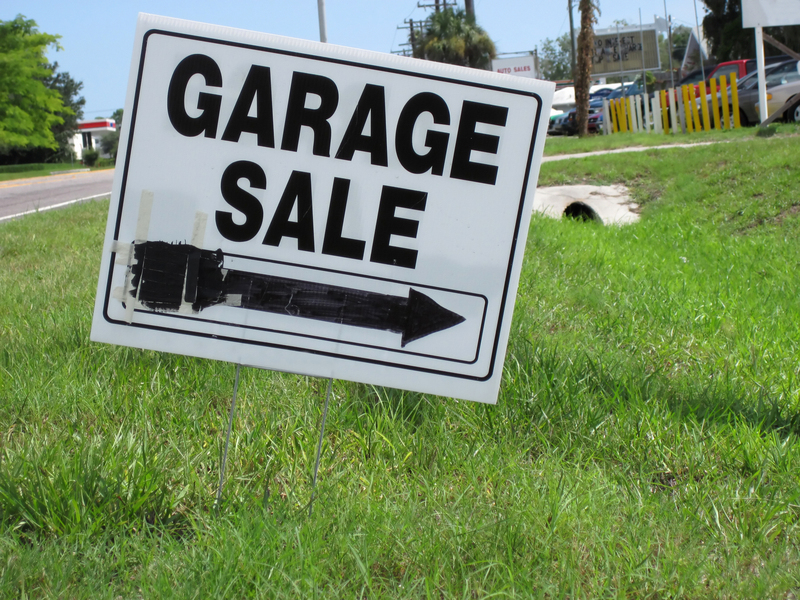Smart Ways to Economize When Clearing Out Bulky Waste
Clearing out bulky waste such as old furniture, appliances, and large debris can be a daunting and sometimes expensive task. Whether you're renovating, moving, or simply decluttering your home, finding efficient and cost-effective solutions is essential. This comprehensive guide uncovers smart ways to economize when clearing out bulky waste, helping you save money, time, and even protect the environment.

Understanding Bulky Waste: What Qualifies?
Before kicking off your cleanup project, it's crucial to understand what qualifies as bulky waste. Typically, items that are too large to be collected by regular curbside trash services--like sofas, mattresses, refrigerators, branches, and broken equipment--fall into this category. Recognizing what counts as bulky rubbish will help you choose the most economical bulk disposal methods.
- Old or broken furniture (couches, beds, wardrobes)
- Large household appliances (fridges, washers, dryers)
- Mattresses and box springs
- Renovation debris (drywall, sinks, bathtubs)
- Outdoor waste (branches, sheds, fences)
- Electronics and large toys
Plan Ahead: The Key to Economizing Bulky Item Disposal
A little planning goes a long way when it comes to minimizing the cost of clearing bulky waste. Here are some savvy steps to strategize your cleanout:
- Inventory Your Bulky Items: Make a list of everything you need to discard. Sorting items by type (metal, wood, fabric, electronics) can significantly reduce removal fees and help with responsible disposal.
- Check Local Regulations: Most municipalities provide clear guidelines and sometimes free services for bulk waste disposal. Review your city's website or waste management authority for scheduled collection events or facilities accepting large items.
- Schedule Your Cleanout Wisely: Many junk removal companies charge less during off-peak times, typically at the start or end of the week. Plan your cleanup accordingly to save on service charges.
Reuse, Donate, or Sell to Save on Bulky Waste Removal
One of the smartest and most sustainable ways to dispose of bulky items is to avoid sending them to landfill entirely. Consider whether your unwanted goods can be reused, donated, or sold:
1. Donate to Local Charities
Many charitable organizations will collect usable furniture and appliances for free. This is an eco-friendly bulky waste disposal method that relieves you of removal costs while helping others. Look for charities in your region that accept bulk pickups, such as:
- Habitat for Humanity ReStores
- Goodwill and Salvation Army
- Local homeless shelters or outreach centers
2. Sell Online
In the digital age, selling unwanted items is easier than ever. Platforms such as Facebook Marketplace, Craigslist, and Gumtree allow you to post free listings for local pickup. This not only helps you save on disposal costs--it can also put cash in your pocket!
- Take clear photos and write honest descriptions
- Be truthful about condition--sometimes "Free if you can carry!" is all the incentive someone needs
- Arrange safe, contactless pickups when possible
3. Upcycle or Repurpose
Get creative! With a bit of effort, old salvaged materials can be turned into DIY projects, such as turning a wardrobe into a bookcase, or converting an old door into a table. Not only is this cost-effective bulk waste management, but it also reduces environmental impact.
Leverage Free and Low-Cost Local Collection Services
Many municipalities now offer free or affordable bulk waste pickup events. These services may be scheduled periodically--often once per quarter--or upon request for a small fee.
- Check your city's website for annual spring/fall cleanup schedules
- Register early, as slots can fill up during high demand periods
- Sort recyclables and hazardous materials separately to avoid fines
Tip: Combine your own cleanout with neighbors or friends to make the most of allowed bulk pickup quotas, or to split the cost of private removal services.
Rent a Skip or Dumpster and Share Costs
For major home clear-outs or renovations, renting a skip or dumpster may be unavoidable. This can be an expensive option, but there are smart ways to minimize costs:
How to Make Skip Rental Cost-Effective
- Share with Neighbors: Coordinate with others on your street and split rental costs.
- Fill to Capacity: Avoid wasting space by disassembling furniture and breaking down materials--maximizing volume lowers per-item costs.
- Choose the Right Size: Most people overestimate how big a dumpster they need. Use a volume calculator or request advice from renters for the appropriate size.
- Follow Prohibited Items List: Avoid extra fees by reading the provider's restricted items list, such as tires, paint, and electronics.
Reductions in price and carbon footprint can be achieved simply by consolidating loads and maximizing efficiency.
DIY Disposal: Save Money with a Self-Haul
Hauling bulky waste yourself is often the cheapest option for getting rid of large junk. With access to a truck or trailer, you'll only pay dump or recycling facility fees. Here's how to make the process smoother:
- Sort Your Load: Prepare recyclable materials separately, as many centers offer free or discounted disposal for items like scrap metal, electronics, or green waste.
- Call Ahead: Check operating hours, accepted items, and on-site payment methods for your nearest dump or transfer station.
- Enlist Help: A friend or family member makes lifting and transport safer and faster.
- Borrow or Rent a Vehicle: If you don't own a truck, some rental agencies offer pickups at reasonable hourly rates, especially on weekdays.
*Be sure to follow safety guidelines when lifting heavy items to avoid injury!*
Utilize Professional Junk Removal Services--But Shop Around
When time or physical capabilities are limited, professional junk removal services offer a convenient solution--but prices vary widely. To save money on bulk rubbish removal:
- Get Multiple Quotes: Compare at least three local providers to ensure competitive pricing.
- Ask About Discounts: Seniors, students, and veterans are often eligible for reduced rates.
- Bundle Items: The cost per item typically decreases with larger loads--try to clear everything at once rather than spread jobs over multiple pickups.
- Clarify Pricing: Confirm whether quotes are based on item count, weight, or volume--hidden fees can add up quickly.
By doing due diligence, you can find quality service at the best price.
Separate Recyclables and Hazardous Waste to Cut Disposal Costs
Many municipalities provide dedicated recycling facilities for electronics, metal, and certain plastics. Removing these from your general bulky waste pile can yield big savings:
- Free E-Waste Drop-Off: Most electronics, such as televisions, computers, and batteries, can be recycled at no cost at community centers.
- Scrap Metal Yards: Old appliances and outdoor equipment may actually earn you money when sold as scrap.
- Green Waste Collection: Clean garden waste may be composted for free, rather than contributing to landfill charges.
Hazardous Items (e.g., paints, pesticides, fluorescent bulbs) require special treatment--never mix these with general waste. Many areas offer free hazardous waste collection to ensure safe disposal.
Group Effort: Community Clean-Up Days and Buy-In Bulk
Neighborhood-wide bulky waste collection events are growing in popularity as civic organizations and HOAs seek to keep communities tidy while reducing per-household expenses.
- Cost Sharing: Larger groups often qualify for volume discounts from removal services or rental companies.
- Volunteer Assistance: Local youth groups or nonprofit organizations may help with labor in exchange for donations or service hours.
- Group Bargaining Power: Community coordinators can negotiate better rates than individuals.
This approach not only helps economize but also fosters a stronger sense of neighborhood engagement.
Smart Packing and Disassembly: Reduce Space and Save
Breaking down furniture, removing legs from tables, and compacting materials allows you to fit more in each load, bag, or dumpster--effectively cutting costs.
- Disassemble Everything Possible: Stackable pieces take up a fraction of the space compared to fully assembled ones.
- Compress Soft Goods: Use straps or bags to squish mattresses, cushions, and textiles.
- Bundle Long Items: Tie up branches, pipes, and lumber for easier hauling and disposal.
*Every cubic foot saved represents direct savings in hauling and landfill fees!*

Bonus Tips: Avoiding Fines and Extra Charges
- Always verify local regulations on curbside bulky waste placement (height, weight, separation rules).
- Label or tag specialty items, especially those with hazardous components.
- Schedule last-minute pickups as early as possible, as emergency requests incur extra fees.
Conclusion: Eco-Friendly and Cost-Effective Bulky Waste Management
Clearing out bulky waste on a budget is possible with a strategic mix of planning, community involvement, and sustainable disposal methods. From arranging free donations and leveraging municipal services to maximizing space and sharing costs, there are plenty of smart ways to economize when clearing out bulky waste. With a bit of resourcefulness and attention to detail, you'll not only save money but also make a positive impact on your community and the planet.
For more information, check with your local authority or visit environmental waste resource centers online for specific programs and seasonal events.
